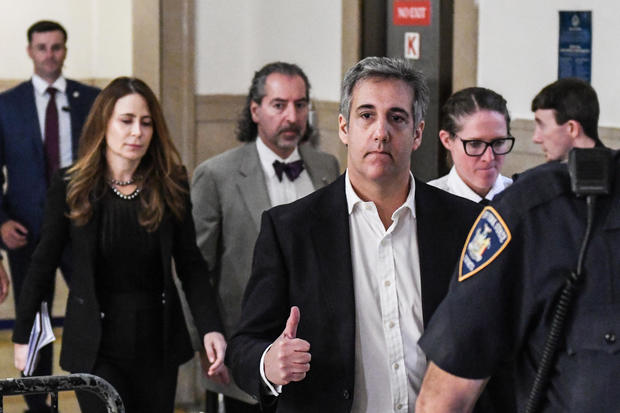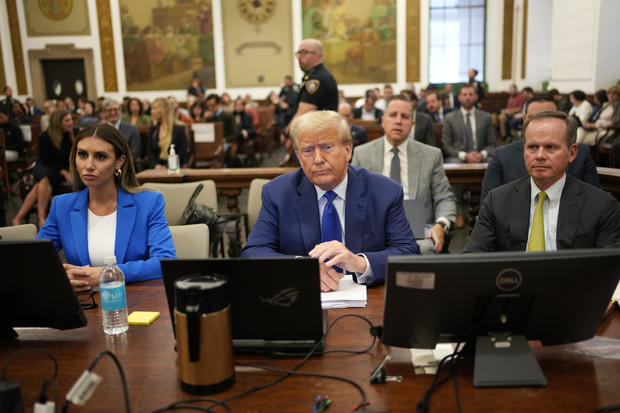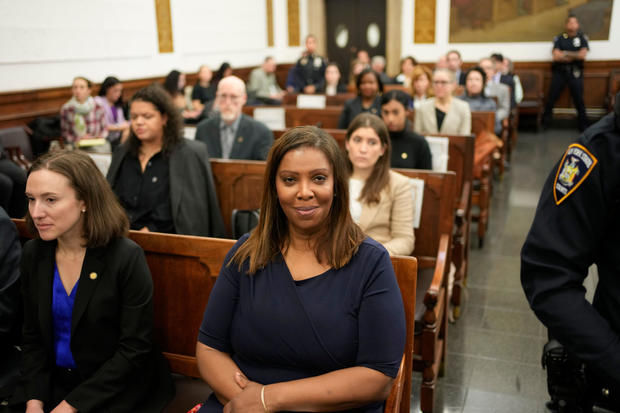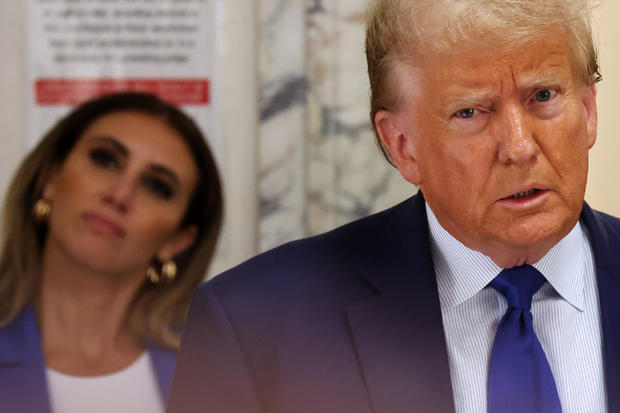On the second day of Michael Cohen’s testimony against former President Donald Trump in his civil fraud trial, a lawyer with the New York attorney general’s office objected to a question from Trump attorney Alina Habba.
The prosecutor, Colleen Faherty, said Habba’s questions appeared to be “bleeding into” issues related to a criminal case against the president, for which Cohen is also a key witness.
Cohen is a former Trump Organization executive who was for years among Trump’s closest confidants. Now he’s at the center of two cases, a criminal one brought by Manhattan District Attorney Alvin Bragg, and a civil one brought by New York Attorney General Letitia James.
Bloomberg
In the courtroom for Cohen’s testimony Wednesday were Todd Blanche and Susan Necheles, two lawyers who represent Trump in his criminal case, in which he has entered a not guilty plea to 34 felony counts of falsification of business records. Several rows behind them was Susan Hoffinger, one of the lead prosecutors in that case, along with four others.
Cohen’s 2019 congressional testimony, in which he said that Trump artificially inflated his wealth, spurred both of the New York investigations. In the civil case, James’ office is seeking $250 million in what it calls “ill-gotten gains” and sanctions that would hamper Trump’s ability to do business in the state.
Trump has denied wrongdoing in both cases.
On Wednesday, Trump’s attorneys repeatedly attacked Cohen’s credibility, continuing an effort that began Tuesday when Cohen acknowledged he lied when he entered a guilty plea to tax evasion in 2018.
Habba said Cohen has “interjected himself into many cases involving my client.”
Seth Wenig / Getty Images
Not long after, she asked if Cohen was ever represented by Robert Costello, an attorney who appeared, at Trump’s request, before the New York criminal grand jury that indicted Trump in March. Cohen said no.
Costello has claimed that Cohen confided in him, and sought to discredit Cohen to the grand jury, saying Cohen was on a “revenge tour” against Trump.
Habba asked if Cohen ever told Costello, “I don’t have anything on Donald Trump.”
Cohen said he didn’t recall saying that.
Did Cohen ever tell Costello that he would do whatever it takes to avoid jail time, Habba asked.
Cohen said he didn’t recall saying that.
Attorney general and Manhattan D.A. “working in tandem”
A few minutes later, Cohen testified that members of both James’ and Bragg’s offices were in some meetings with him. Both offices have acknowledged previously that members of James’ office were assigned to work with Bragg’s office.
“So the A.G’s office and the D.A.’s office were working in tandem?” Habba asked.
“That is correct,” Cohen says.
Soon after that, Faherty told Judge Arthur Engoron that she was worried the questioning was “bleeding into” the other case.
Habba was allowed to continue. She brought up a book by Mark Pomerantz, a former Manhattan prosecutor who previously led the D.A. office’s investigation into Trump. The book describes some of what would ultimately be nearly two dozen meetings between Cohen and investigators for the Manhattan district attorney before Trump’s indictment.
Pomerantz wrote that Cohen’s criminal history raised potential credibility issues. Not mentioned during the testimony, Pomerantz also wrote that he “thought [Cohen] was telling the truth.”
A light moment came soon after Habba brought up that Cohen testified under oath that he assisted in falsifying valuations, but has neither been named as a defendant in the attorney general’s case nor the district attorney’s.
Habba asked if that might be because James’ office didn’t find him credible.
“You’re drawing a conclusion that I don’t know, you can ask Ms. James,” Cohen replied.
From the front row of the gallery, James loudly said, “objection,” eliciting laughter.
Seth Wenig/AP/Bloomberg via Getty Images
Habba also attacked Cohen’s credibility by highlighting what the defense has argued are his motivations for testifying against Trump.
Habba showed text messages entered into evidence in Cohen’s federal criminal case. In the texts from early 2017, an unidentified person asks Cohen who will be White House chief of staff.
The unidentified person guessed Trump’s daughter Ivanka, Jared Kushner and others.
“Keep guessing dopey,” Cohen wrote.
“Stop!!! You???” the person replied.
“I will give you a hint….yes,” Cohen texted.
“omg,” the person replied.
Cohen was not named chief of staff, but he testified that he didn’t ask for that job.
“I was given the position that I asked for. There’s no shame to being personal attorney to the president,” Cohen said.
From adoration to animosity
Habba later brought up Cohen’s many media appearances criticizing Trump, contrasting his public animosity to Trump in recent years with his statements of adoration before Trump’s election and during his first year in office — when Cohen famously once said he would “take a bullet” for Trump.
Habba showed a 2015 television interview in which Cohen said $10 billion could be an underestimate of Trump’s wealth, and an article from that same year in which he was quoted saying Trump had “all the qualifications of a great president.” In another article, Cohen was quoted speaking glowingly of “Mr. Trump’s character and capabilities.” In a tweet, Cohen wrote he believed “whole heartedly that only #Trump will #MakeAmericaGreatAgain.”
But in recent years, Cohen has made a career out of criticizing Trump, he acknowledged on the stand Wednesday.
Habba asked if Cohen talks about Trump during every episode of his podcast. He said he does.
“Mr. Cohen, you have financial incentive to criticize Mr. Trump, correct?” Habba asked.
“Yes,” Cohen said.
She finished her questioning by asking, “Did you ever ask President Trump to pardon you while he was in the White House?”
“No,” Cohen replied.
In 2018, Cohen pleaded guilty to federal charges related to campaign finance violations and lying to Congress.
Cohen was also repeatedly asked about 2019 Senate testimony in which he said Trump never asked him to inflate numbers for “his personal statement.” On the stand Wednesday, Cohen initially called that a lie, before saying he was mistaken in calling it that. He said Trump never directly asked him.
His apparent uncertainty caused Clifford Robert, an attorney for Eric Trump and Donald Trump Jr., to ask Judge Engoron to summarily end the case.
Engoron denied the request. Trump immediately stood up and walked out, his Secret Service detail in tow.
Motion to dismiss “absolutely denied”
During redirect questioning by the state, Cohen was asked to explain further the issue with his Senate testimony.
“He did not specifically state, ‘Michael, go inflate the numbers,” Cohen said. “Donald Trump speaks like a mob boss. He tells you what he wants without explicitly telling you. We understood what he wanted.”
Before Cohen was excused, Robert moved again to dismiss the case on the grounds that Cohen, whom he called a key witness, had lied several times. “End this once and for all,” he asked the judge just before court was adjourned for the day.
“Absolutely denied,” Judge Engoron said, adding that there is plenty of evidence in the case, credible or not, and that he doesn’t consider Cohen to be a key witness. “No way, no how… there is enough evidence in this case to fill this courtroom.”
Cohen alleged in his first day of testimony Tuesday that Trump told him to adjust statements of financial conditions — documents at the core of the fraud case — to arrive at a net worth that Trump assigned himself “arbitrarily.”
Cohen’s testimony under cross-examination both days was often combative. Cohen several times replied to Habba’s questions with the phrase, “asked and answered” — an objection lawyers sometimes raise, but witnesses cannot.
At one point Tuesday, Trump attorney Christopher Kise jumped out of his chair. He protested to the judge, saying, “this witness is out of control.”
Trump questioned on gag order, fined $10,000
While Cohen was the focus of lawyers in the courtroom Wednesday, a statement made just outside the doors during a break brought the focus back to Trump.
During a mid-morning break, Trump made a reference to reporters about “a person who is very partisan sitting alongside” the judge. The judge’s clerk, Allison Greenfield, typically sits right next to the judge, and during pretrial hearings often questioned attorneys for the two sides herself.
Earlier in the month, the judge imposed a limited gag order barring Trump from making inflammatory comments about court staff after he posted about Greenfield on social media.
During the court’s lunch break, after reporters were led from the room, lawyers from both sides and Trump remained inside for nearly an hour.
When court resumed, Trump was immediately called to the stand and sworn in. Engoron questioned him.
Trump acknowledged making the statement, but said it was about “you and Cohen.”
“You didn’t mean the person on the other side of me?” Engoron asked, referring to Greenfield.
“Yes, I’m sure,” Trump said.
Soon after, Trump was allowed off the stand. Engoron issued him a $10,000 fine.
/ Getty Images
Attorneys for Trump protested, saying Greenfield’s behavior was unusual for a law clerk.
Trump attorney Alina Habba said she “does not like being yelled at by law clerks who did not earn the robe,” and said Greenfield’s ” influence on the bench is completely inappropriate and it should stop.”
Engoron countered that his practice is to consult with his law clerks.
“I value input from both my law clerks,” Engoron said. “Every judge does things differently. I don’t know if others have them sit on the bench, that’s how I do things. I make the final decisions.”
This is the second time Trump has been fined since the gag order was put in place. He was fined $5,000 on Oct. 20, because a replication of the since-deleted social media post that sparked the order had never been taken down from a campaign site.
Engoron implied Trump will be fined more if he breaks the gag order again.
“Do it again, it’ll be worse,” Engoron said.



